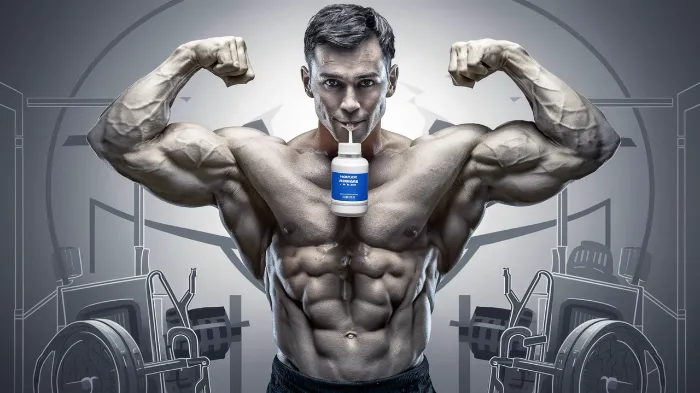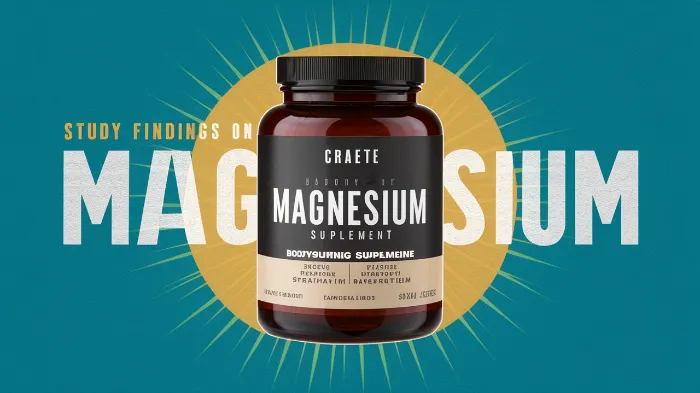
Alright, let's talk about something that's on a lot of our minds – testosterone. That manly hormone that keeps us feeling strong, energetic, and, well, like men. We've all heard the claims that magnesium can give your testosterone a nice little boost, but is there any truth to it?
In this article, let's get to know if can magnesium boost testosterone levels by examining the scientific evidence and studies to break down the truth behind this claim.
Fundamentals of Magnesium
Magnesium is a pivotal mineral in the human body, playing a vital role in over 300 enzymatic reactions. It is essential for the proper functioning of nerves, muscles, and many other parts of the body. Magnesium also contributes to the structural development of bones and is necessary for the synthesis of DNA and RNA.
| Function | Role of Magnesium |
|---|---|
| Muscle and Nerve Function | Regulates neuromuscular signals and muscle contractions |
| Bone Health | Contributes to bone structure and mineralization |
| Energy Production | Aids in converting food into energy |
| Protein Formation | Helps create new proteins from amino acids |
| Genetic Maintenance | Involved in DNA and RNA synthesis |
Magnesium and Testosterone Boost
In the context of sexual health and performance, magnesium has garnered attention for its potential influence on testosterone levels. As an essential nutrient, it assists in several physiological processes that could intersect with hormonal regulation and synthesis.
Magnesium is key to testosterone regulation, impacting synthesis and hormonal balance. Below is an overview of its role, the effects of deficiency, and supplementation benefits:
Magnesium's Role in Testosterone Synthesis
Magnesium plays a crucial role in testosterone synthesis primarily through its involvement in vitamin D synthesis in the liver. This process is vital because vitamin D is closely linked to testosterone production.
The study concluded that magnesium supplementation boosts testosterone levels, especially when combined with exercise.
An NCBI study found that 4 weeks of magnesium supplementation (10 mg/kg body weight) increased both free and total testosterone levels in sedentary individuals and athletes practicing tae kwon do.
Magnesium aids in the conversion of cholesterol into vitamin D, which indirectly supports the maintenance of normal testosterone levels. This intricate relationship underscores the importance of magnesium in hormonal health, particularly in testosterone regulation.
Magnesium and Deficiency
Magnesium deficiency, widespread in Western societies from soil depletion and processed food intake, can reduce testosterone levels. It's vital for testosterone production as it regulates enzymes converting cholesterol into testosterone. Individuals with a deficiency in magnesium often experience a corresponding decrease in testosterone levels.
This correlation highlights the importance of magnesium in maintaining not only general health but also hormonal balance. For those with low magnesium levels, supplementation can be particularly beneficial, potentially aiding in the normalization of testosterone levels.
Supplementation Impact
However, the impact of magnesium supplementation on testosterone levels varies depending on an individual's baseline magnesium status. For those with adequate levels of magnesium, supplementation may not significantly alter testosterone levels.
Yet, for individuals with a deficiency, the effect of supplementation can be more pronounced, potentially leading to an increase in testosterone levels. This differential impact suggests that magnesium supplementation should be considered more of a corrective measure rather than a universal solution for boosting testosterone.
Magnesium Supplementation Insights

Magnesium supplementation has sparked interest for its role in enhancing testosterone levels, crucial for sexual health. Here's a condensed overview:
Magnesium’s Effects on Sexual Health
Magnesium's role in sexual health is multifaceted and profound, influencing aspects from erectile function in men to orgasmic response in women. It acts as a pivotal element in testosterone production, where its deficiency is linked to reduced levels of this crucial hormone, potentially decreasing libido and increasing erectile dysfunction.
1. Magnesium and Erectile Dysfunction
Testosterone production can be affected by magnesium levels. Lower levels of magnesium are associated with decreased testosterone production, which can impact sex drive and contribute to erectile dysfunction.
Magnesium plays a crucial role in the metabolism of nitric oxide, which is integral to the penile erection process. A deficiency in magnesium can lead to reduced levels of nitric oxide, making it more challenging to achieve an erection. Additionally, magnesium is essential for maintaining healthy blood pressure levels, and high blood pressure is a known cause of erectile dysfunction.
2. Female Sexual Health
Magnesium may aid in soothing difficulties that occur in reaching orgasm in women, known as anorgasmia. By relaxing the mind and body, magnesium can facilitate sexual arousal and sex-drive response, potentially increasing the likelihood of orgasm
Magnesium Deficiency: Prevent, Identify, And Cure!
| Aspect | Details |
|---|---|
| Symptoms | – Loss of appetite – Nausea – Fatigue – Numbness – Muscle cramps – Seizures – Abnormal heart rhythms |
| Supplementation | – Forms: oxide, citrate, lactate, chloride – Excessive intake risks: diarrhea, nausea, cramps Upper intake limits: – Adults – 350 mg/day – Children (1-8 years) – 65-110 mg/day |
| Food Sources | – Green leafy vegetables (e.g., spinach) – Legumes, nuts, seeds – Whole grains – Fortified foods |
Approximately 30% to 40% of dietary magnesium is absorbed by the body, highlighting the importance of consistent dietary intake.
Caution:
Magnesium can interact with several medications, including bisphosphonates, antibiotics, and diuretics, affecting their absorption or efficacy.
Maintaining adequate magnesium levels through a balanced diet or supplements, when necessary, is crucial for health. However, it's essential to consult healthcare professionals before starting any supplementation, especially for individuals on medication, to avoid potential interactions.
Research Insights on Magnesium

Magnesium plays a crucial role in various aspects of human health, including testosterone regulation, muscle function, and athletic performance. Recent research has shed light on the multifaceted benefits of magnesium supplementation, particularly for individuals with deficiencies and those engaged in strength training or intense exercise.
Regulating Testosterone
Essential for over 300 enzyme reactions, magnesium supports muscle and nerve function and plays a role in testosterone regulation.
- For individuals with a magnesium deficiency, supplementation is crucial and can significantly elevate testosterone levels, addressing hormonal imbalances.
- For those with adequate magnesium intake, supplementation does not yield a significant impact on testosterone levels, highlighting the necessity for targeted supplementation based on individual dietary intake and health status.
Muscle Health And Power
Magnesium's role in muscle function and physical performance has been documented in several studies. A notable improvement in muscle strength and power is observed in young men who engage in strength training programs and consume magnesium at daily intakes higher than 250 mg, with more pronounced effects at 500 mg per day.
Oxygen Intake During Exercises
Magnesium deprivation is linked to increased oxygen requirements during exercise and diminished endurance, suggesting a pivotal role of magnesium in energy metabolism and muscular contraction.
Additionally, it's worth noting that magnesium intake is often found to be lower in female athletes, and serum magnesium levels may decrease during intense or long-term exercise, emphasizing the importance of magnesium in athletic performance.
Safe Practices in Supplementation
When considering magnesium supplementation, especially for its potential to affect testosterone levels, it is paramount to follow safe supplementation practices. This ensures not only the most effective outcomes but also protects against potential health risks.
Alternative Natural Testosterone Boosters
In addition to diet and lifestyle changes, certain herbs and natural supplements have been associated with increased testosterone levels. According to a systematic review by NCBI, certain herbal extracts, such as Fenugreek seed extracts and Ashwagandha root/ leaf extract, Asian Red Ginseng and Forskohlii Root Extract have shown positive effects on testosterone concentrations in men.
These herbs are believed to work by various mechanisms, such as influencing luteinizing hormone production or directly stimulating testosterone synthesis. However, it's important to note the variability in study findings and the need for further research to confirm efficacy and safety.
While exploring alternative natural testosterone boosters, it's essential to keep in mind that supplementation should not be a substitute for professional medical advice.
The Final Verdict On Can Magnesium Boost Testosterone
Look, the research is pretty clear – magnesium can give your testosterone levels a nice boost, but it's not a magic bullet. The impact of magnesium appears to be most significant when addressing a deficiency rather than as a general testosterone enhancer for those with adequate levels.
Oh, and here's a pro tip – Combine magnesium with regular exercise for maximum impact on your testosterone. The research shows that magnesium and working out is a power combo for keeping those manly hormones humming.
At the end of the day, a balanced diet, staying active, and taking care of any nutrient deficiencies are probably your best bet for keeping your testosterone where it should be.







